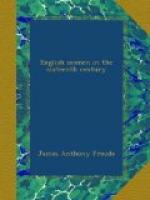The missing ships dropped in one by one, but a week passed and a third of them were still absent. Another despairing letter went off from the Duke to his master. He said that he concluded from their misfortunes that God disapproved of the expedition, and that it had better be abandoned. Diego Florez was of the same opinion. The stores were worthless, he said. The men were sick and out of heart. Nothing could be done that season.
It was not by flinching at the first sight of difficulty that the Spaniards had become masters of half the world. The old comrades of Santa Cruz saw nothing in what had befallen them beyond a common accident of sea life. To abandon at the first check an enterprise undertaken with so much pretence, they said, would be cowardly and dishonourable. Ships were not lost because they were out of sight. Fresh meat and bread could be taken on board from Corunna. They could set up a shore hospital for the sick. The sickness was not dangerous. There had been no deaths. A little energy and all would be well again. Pedro de Valdez despatched a courier to Philip to entreat him not to listen to the Duke’s croakings. Philip returned a speedy answer telling the Duke not to be frightened at shadows.
There was nothing, in fact, really to be alarmed at. Fresh water took away the dysentery. Fresh food was brought in from the country. Galician seamen filled the gaps made by the deserters. The ships were laid on shore and scraped and tallowed. Tents were pitched on an island in the harbour, with altars and priests, and everyone confessed again and received the Sacrament. ‘This,’ wrote the Duke, ’is great riches and a precious jewel, and all now are well content and cheerful.’ The scattered flock had reassembled. Damages were all repaired, and the only harm had been loss of time. Once more, on the 23rd of July, the Armada in full numbers was under way for England and streaming across the Bay of Biscay with a fair wind for the mouth of the Channel.




